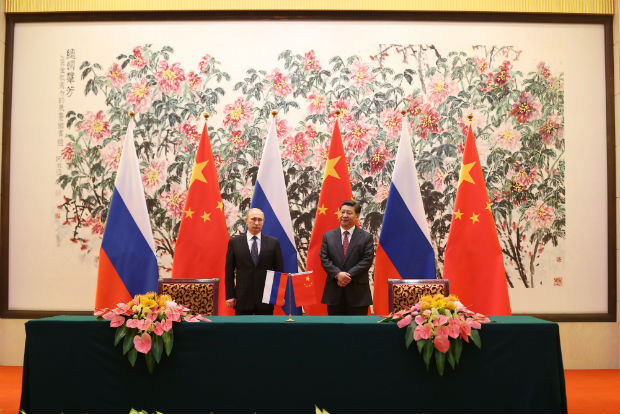
Russian President Vladimir Putin, left, and his Chinese counterpart Xi Jinping stand together during a signing ceremony at the Diaoyutai State Guesthouse in Beijing, Nov. 9, 2014. The Asia-Pacific Economic Cooperation (APEC) 2014 Summit and related meetings will be held in Beijing on Nov. 10 and 11, gathering leaders of 21 member economies. AP
Beijing, China – World leaders including Barack Obama arrived in Beijing Monday for an Asia-Pacific summit hosted by China’s Xi Jinping and including Russia’s Vladimir Putin, against a backdrop of growing big-power rivalries.
Obama arrives wounded by the Democrats’ defeat in the mid-term US elections and with US-Russian relations in the deep freeze, while Moscow warms to an increasingly assertive China.
The gathering is the biggest event yet hosted by the Chinese president, who took office last year and who spotlighted his country’s expanding world profile Sunday by declaring a bright future ahead for the vibrant Pacific Rim – with a confident China at its heart.
The annual two-day summit of Asia-Pacific Economic Cooperation (APEC) countries is a rare chance for such a wide range of top leaders to be in the same room, and the typical pledges of amity and trade convergence are often balanced by tense sideline exchanges on festering geopolitical problems.
Beijing and Tokyo’s historically frosty relations are at their lowest point in decades over competing claims to Japanese-controlled islets in the East China Sea that have raised the spectre of armed clashes.
But the world’s second- and third-largest economies announced a four-point accord Friday to improve ties, fuelling speculation that Xi and his counterpart Shinzo Abe could meet in Beijing in the first top-level encounter in nearly three years.
Obama flew in Monday morning, at a time when Russia is under Western economic sanctions over its seizure of the Crimea and role in a separatist war in eastern Ukraine.
No Obama-Putin meeting is known to be scheduled, but Australian Prime Minister Tony Abbott has vowed to confront the Russian strongman over Malaysia Airlines flight MH17, which was brought down over eastern Ukraine in July, with 38 Australians among the 298 dead.
The West has accused pro-Russian rebels of blasting it out of the sky with a missile and Moscow of impeding investigations. Russia denies the accusations.
Big-power rivalry
APEC brings into focus a broader big-power rivalry involving Washington, Beijing and Moscow.
Russia and China both regularly express impatience with a perceived US domination of world affairs and often move in tandem on the UN Security Council, vetoing or abstaining from US-led initiatives.
Putin and Xi met Sunday in Beijing, with the Chinese leader warmly calling for the once bitter Cold War rivals to continue to “harvest” the fruits of their friendship.
“No matter the changes on the global arena, we should stick to the chosen path to expand and strengthen our comprehensive mutually fruitful cooperation,” Xi said.
Putin said their cooperation was “very important for keeping the world within the framework of international law”.
China and the United States already have jousted in Beijing over differing visions of how to achieve Asia-Pacific trade integration, adding to persistent discord over commerce, human rights, cyber-espionage, and territorial disputes.
The White House has said it expects “candid and in-depth conversations” between Obama and Xi, who are due to have several meetings.
As well as the row with Japan – a US security ally Washington is bound by treaty to defend if attacked – Beijing’s growing assertiveness in the South China Sea has also rankled rival claimants to parts of the strategic waters.
Another likely discussion topic between Xi and Obama is North Korea, following the surprise weekend release of two Americans who were imprisoned by the secretive state.
Beijing is Pyongyang’s closest ally, and the prisoner release could fuel speculation the sabre-rattling North may be willing to resume international, China-chaired talks on its nuclear program.
It should be all smiles, however, when the APEC leaders gather Monday for a “family photo”, when they typically wear the host’s national dress.
The event culminates Tuesday with a formal leaders’ summit.
APEC kicks off a week of high-level summitry that will see Obama and other top leaders travel next to Myanmar to attend the East Asia Summit, followed by G20 talks in Brisbane, Australia.
China is hosting APEC for the first time since 2001, when it was still re-emerging as a world economic power.
But in a speech Sunday, Xi underlined how much has changed by offering his vision of an “Asia-Pacific dream”, in which China’s continued rise offers “infinite promise” to all.
Originally posted: 7:00 AM | Monday, November 10th, 2014